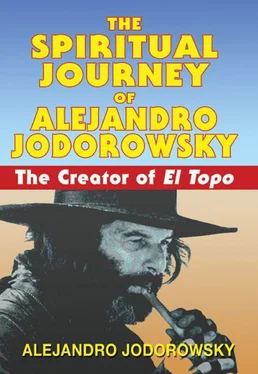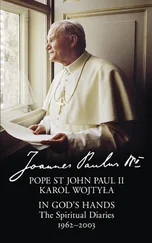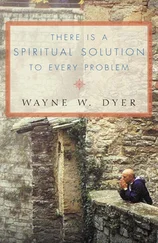Listening to this — with my mind organizing Ejo’s fragmentary phrases, because of his modest command of Spanish — I felt I had understood the two responses. In the tree: if I speak, I intellectualize and lose myself. Under the tree: if I answer by trying to translate the truth into words, I destroy it and I wind up with sentences that, however elegant, are no more than snow in a silver vase.
“Ejo, I want to hang from the tree!”
“Can you take it? Zen is not a game. It is not a mystical pastime for privileged hippies. Awakening cannot be bought or sold. It is earned by losing everything, sometimes even your reason and your life.”
“Teach me, I beg you!”
“I can teach you only how to teach yourself.” Now Ejo Takata seemed to undergo a change. It was as if he had rid himself of a coat of lead. He stood more erect, vibrant with energy, a huge smile lighting up his face. “We shall do a rohatsu . We will meditate for seven days.”
“What is a rohatsu? ”
“A Zen technique equivalent to hanging from a branch by your teeth. You are allowed only one bowl of rice a day, forty minutes of sleep, and fifteen minutes to go to the toilet. The rest of the time, you must sit without moving.”
“But Ejo, this is the rainy season. The mosquitoes will devour us. .”
“And they will enjoy a fine feast! Enough discussion. If you agree to do it, remove your shoes, and we’ll start immediately. If you don’t have the courage to do it, then go and burn your secret book. Koans are not poetic games. Resolving them means surrendering to a mutation. That woman you spoke of in your essay: meditating next to the Buddha, she realized ignorance ignores itself and she discovered that she is the Buddha. Do you want to awaken? Yes or no?”
“Yes!”
I removed my shoes, kneeled, took the only remaining cushion, and put it between my legs, bringing my feet together behind my back with my knees planted upon the wooden platform as if they were anchors fastening me to the center of the earth. I straightened my spine as much as possible, imagining that I was being pulled upward by my hair. Suspended between heaven and earth, I was like a strung bow ready to shoot an arrow. I placed my hands so that they were lying flat on my lap, right upon left, letting my two thumbs touch with very slight pressure, neither too much nor too little, “neither mountain nor valley.” I did not close my eyes, but instead let them focus upon the floor about three feet in front of me, the corners of my mouth in a faint smile. Ejo Takata took up the very same position. Nevertheless, compared to him, I was like a pile of jelly next to a block of granite.
He lit a stick of green incense, struck a metal bowl with a wooden mallet to produce a peaceful ring, and with no further ado, my course of torture began.
We were in semidarkness. The closed window barely muffled the noise of the traffic — cars, trucks, cries from the street. From the kitchen on the ground floor we could hear the delicate movements of the master’s companion. We could also hear the faint sounds of Japanese-style rock music that Tomiko had brought with her, but at a very low and discreet volume. All these noises were as nothing compared to the buzzing of a mosquito that appeared next to my ear.
Valiantly, with an almost delirious enthusiasm, I intensified my meditation, deciding to become a statue. After an hour, I began to flinch. The pain in my legs was growing worse every minute. When I could no longer take it, I tried to change my position. Ejo let out a lion’s roar, which paralyzed me. To flee my body, I tried to take refuge in my mind. I imagined landscapes, interstellar voyages, multiformed clouds, zzzzz. . I was awakened by another terrifying roar. Ejo got up and gave me three blows of the kyosaku on each shoulder blade. This had a refreshing effect, and I was once again filled with enthusiasm and felt rested. I meditated. An hour. . another hour. . another. . another. I was thirsty and hungry and my entire body was in pain. I had gas in my stomach. Ejo leaned to the right, lifted a buttock lightly, and let out a string of the loudest farts I’ve ever heard. Then he returned to his granite posture of meditation. With deep shame, I also let myself fart aloud. As I was in the midst of this odoriferous occupation, Michiko entered, dressed in a sober kimono. Before each of us she placed a bowl of steaming rice with bits of carrots, chopsticks, and a glass of green tea.
“Eat quickly; don’t waste time,” Ejo commanded. “The important thing is the meditation.”
Like him, I had to wolf down the rice, to the great displeasure of my tongue. In order not to waste a single grain (waste is forbidden to monks), I poured a bit of tea into the bowl and shook it, then drank the burning mixture containing the last grains.
When Michiko removed the bowls, Ejo lit another stick of incense and we continued as before, mute and motionless. Now, though, we were allowed to interrupt the sitting once an hour, walking in a circle for five minutes to free our legs of swelling. Mine felt as if an army of ants had invaded them.
At midnight, Ejo said: “We will now sleep for forty minutes, no more.” Suddenly, without changing his position, he began to snore. A mood of desperation overcame me as I noticed my shoes. Their openings seemed like two generous mouths inviting me to place my feet inside them and escape for good, abandoning this monstrous folly. Yet it was my pride that held me back — a monstrous pride that, until then, I had not even known existed in me. The only movement I made was to lie down on the floor. I felt like a dog. I was used to soft mattresses and had difficulty finding a comfortable position on the hard floor. I had trouble falling asleep. Suddenly, a terrifying noise brought me out of deep sleep. Ejo was pounding on a flexible metal plate with a steel bar, which produced sounds like thunder. I had trouble rising, and he gave me several kicks to wake me up.
“The forty minutes have passed! Quickly, quickly, don’t waste any more time! Sit up and meditate.” I felt like killing him.
The first two days passed. Not even a glimpse of wisdom had come to calm my mind. These days were simply hours of struggle — with my body and its swelling, cramps and pains right to the bones, mosquito bites, hunger, sleepiness, burning in my stomach, feelings of suffocation, claustrophobia, and rage against this accursed Japanese who endured such torture impassively. There were brief moments when the physical suffering miraculously disappeared, but then a profound boredom appeared, plunging me into unbearable anguish.
On the third day, my knees were swollen, my eyes were burning, my skin was covered with a rash, my vertebrae felt like fists, and my bowels were full, because the pressure to rush to the toilet and defecate in only minutes had constipated me. Feeling as if every nerve in my body had become an electric needle, I suddenly allowed myself to collapse on my back. In a plaintive voice imitating agony, I whined: “I have a sharp pain in my chest. I’m having a heart attack. Call an ambulance.”
With ferocity and contempt, Ejo snapped back at me: “Then die!” Without deigning to help me, he maintained his posture, more granitelike than ever. I rolled on the floor, stamping my feet, crying. I grabbed a shoe and threw it at his head. But Ejo merely ducked slightly, just enough to avoid the projectile, and returned to his meditation.
Suddenly, my rage became like a kind of nourishment. Possessed by a new kind of energy, I sternly told my body to go to hell and resumed my meditation position, straightening my spinal column, forcing the corners of my mouth into a slight smile, fixing my eyes upon the floor in front of me; I was transformed into a statue. I felt very distant from this abominable, animal suffering. I had the impression of floating in a diaphanous sky. After an hour of deep calm during which I felt I was the Buddha, a profusion of images invaded my brain: sexual fantasies, lust for great wealth and fame. . and then a parade of delicious food, meats, desserts, drinks, yet also succulent morsels of human flesh. Then I imagined all sorts of tortures inflicted upon men, women, and children with naked, bloody, mutilated bodies — and me floating safe and sound above this hell. I spent hours trying to vanquish this diabolical dimension of my being, but as soon as I thought I had succeeded, there arrived painful memories of the mother who never caressed me, the infantile and competitive father who used terror as a means of education, the selfish elder sister who did everything to expel me from the family so that she could be the center of attention, the cruel and intolerant classmates, the neurotic schoolteachers, and the loneliness and humiliations. It came like a tornado, causing streams of tears and mucus to run down my cheeks. Yet my enforced immobility prevented me from drying them or hiding them. To escape this morbid cemetery of the imagination, I began to compose poems, which then became stories, theater pieces, films, novels. Stories arrived, opened themselves like flowers, and then dissolved into the void. I took a long voyage into my brain, discovering a delirious universe that constantly produced images of all sorts — shapeless forms, beings, mandalas, complex geometrical designs, explosions, vast shiftings, beams of light, changing whirlwinds of madness.
Читать дальше












